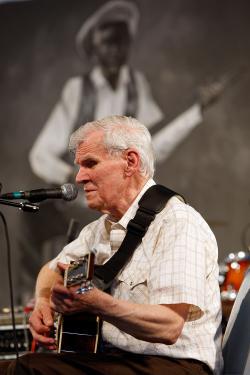Doc Watson, the singer, guitarist, and songwriter who first became nationally famous during the folk revival—but whose musical interests extended beyond folk to blues, gospel, rock, and beyond—died yesterday in Winston-Salem, N.C., after undergoing surgery. He was 89.
Born in 1923 in unincorporated Deep Gap, N.C., Watson seemed to many folk revivalists the embodiment of traditional music. His father had made Watson’s “first little stringed instrument,” as he told Terry Gross in 1988, and taught him “a few of the old-time frailing or clawhammer banjo style tunes.” (The instrument his father built him was “a fretless banjo with a head made from the skin of a family cat that had just died.”) “It was kind of hard for dad to show me,” Watson said, “because I couldn’t see his hands.” He had gone blind as an infant after an eye infection.
But Watson didn’t restrict himself to the “old-time” tunes. He bought his first guitar from Sears Roebuck with money he got from chopping down chestnut trees on the family field and selling it “for pulpwood to the tannery.” And he took quickly to rockabilly, which he played throughout the 1950s. In the early ’60s, however, the folklorist Ralph Rinzler suggested he go back to the acoustic guitar and play the songs he’d learned growing up. Watson took his advice and became a star of the ’60s folk scene.
He was best known for his versatile guitar picking. As David Menconi noted in a 2003 profile for the Raleigh News & Observer, Watson had “huge hands, working hands, and they make the guitar almost look like a toy.”
He was, above all, a versatile and immensely talented musician. “I’ve enjoyed picking a lot of things besides old-time music,” he told Menconi, who then watched him perform a wide range of songs, including “Unchained Melody” and “Nights in White Satin.” Watson, Menconi noted, “never paid much attention to boundaries.”
